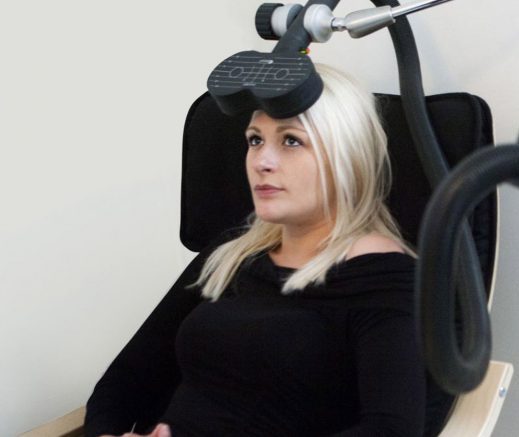Don’t Let Cognitive Decline Hold You Back: Optimize Your Brain Performance with MeRT

Cognitive performance can decline over time due to age, chronic stress, and health issues. The stress of daily life and other demands can cause burnout, which can also lead to lowered brain performance.
All this can be incredibly frustrating, not to mention anxiety-provoking. And it can leave you feeling isolated. That’s hardly where you thought you would be at this stage in life, right?
The good news is you don’t have to live with this. We offer a breakthrough treatment, MeRT (Magnetic e-Resonance Therapy), which can optimize your brain performance and get you feeling like yourself again!
Call Our New Patient Coordinator to Learn More About Brain Optimization with MeRT
What is Cognitive Decline?
The term “cognitive decline” means the gradual loss of brain function, with different levels of severity:
- Gradual mental decline because of normal aging: Here, you may occasionally forget names and words or misplace items. But these don’t affect your ability to function well in daily life. And it doesn’t affect intelligence, recognition, or long-term memory.
- Mild Cognitive Impairment (MCI): This is the stage between the mental changes seen in normal aging and early-stage dementia. It may include problems with memory, language, or judgment, and family and friends may notice the changes.
- Dementia or Alzheimer’s Disease: Here, symptoms affect your memory, thinking, and social abilities, and they’re so severe that they interfere with your daily life. While Alzheimer’s disease is the most common cause of this type of dementia, it’s not the only cause.
Recognizing and acting on cognitive decline symptoms can be the key to preventing its progression. According to the Mayo Clinic, “Cognitive Impairment may increase the risk of dementia caused by Alzheimer’s disease or other brain disorders. Some people with Cognitive Impairment might never get worse. And, some eventually get better.”
Risk Factors and Symptoms
While aging is the primary risk factor for cognitive decline, other risk factors include:
- family history/genetics
- diet
- education level
- brain injury
- exposure to pesticides or toxins
- physical inactivity
- chronic conditions such as Parkinson’s disease
- heart disease and stroke
- diabetes
Symptoms vary based on the cause of the cognitive decline and its severity. These include:
- Forgetting things more often, including social engagements 0r appointments
- Burnout, mental fatigue
- Losing your train of thought or the thread of conversations
- Problems finding your way around familiar environments
- Becoming more impulsive
- Feeling more and more overwhelmed when making decisions or plans 0r understanding instructions.
- Poor judgment
- Repetitive questions
- Difficulty expressing thoughts and emotions
- Trouble reading, writing, or speaking
- Delusions, hallucinations, or paranoia
- Loss of independence
- Loss of appetite or the desire to eat
To help improve your brain function, Dr. Julie Kim and the team at the Brain Treatment Center of San Diego offer MeRT treatment for Brain Optimization.
MERT and Brain Optimization

MeRT is an emerging technology that aims to improve brain function and communication. The equipment used is FDA-cleared to treat Major Depressive Disorder and OCD and is used off-label to treat a wide variety of conditions, including improving brain performance.
MeRT protocols start with a qEEG (quantitative EEG), also called brain mapping. The qEEG report shows patterns of brain dysfunction.
Then, with TMS, we use gentle magnetic waves to stimulate the specific areas of the brain not functioning optimally.
We tailor this personalized protocol based on the location, frequency, and amount of power used by the magnet. The aim of MeRT is to improve brain communication and synchronization, leading to significant and long-lasting improvements.
The equipment used is FDA-cleared to treat Major Depressive Disorder and OCD and is used off0label to treat other neurological-related conditions, including Cognitive Decline and Brain Optimization.
Benefits of MeRT Treatment

- Improved sleep
- Clearer thinking
- Increased motivation
- Decreased anxiety
- Improved concentration skills
- Better attention span and decreased response to distractions
- Better mood
- Improved decision-making skills
- Greater emotional stability
- More energy
- Improved social skills
- More self-confidence
- Elevated sports/athletic performance
Call Our New Patient Coordinator to Learn More About Brain Optimization with MeRT
Is MeRT the Right Treatment for You?
We understand MeRT is a relatively new treatment, and you may not be sure if this is right for your situation. However, know that this is not a decision you have to make right away or all alone.
Your first step is a simple phone consultation with our New Patient Coordinator. During this free, no-obligation consultation, you can discuss symptoms and history, ask all the questions you want, and have her explain the protocols and fees. She can also further explain the treatment itself.
After the call, if you are interested in taking the next step, we can set up an appointment for a qEEG (a simple, painless, and non-invasive brain scan).
EEG/EKG Testing

The qEEG/EKG testing is performed by our chief neuro technician and takes approximately 45 minutes.
We will also gather your new patient paperwork and get you scheduled for your initial assessment period of treatment.
Clinical Evaluation and Consultation
Your second appointment will be a clinical evaluation with Nurse Practitioner Kayleigh Prowse, which will take approximately 45 minutes. You can have this appointment via Telemedicine or in-clinic, whichever you prefer.
During this consultation, Kayleigh will answer all your questions and discuss your applicable treatment plan. Please be assured that Dr. Julie Kim oversees all care and treatment protocols.
Assessment Period

The assessment is two weeks long. It comprises ten treatment sessions, followed by a repeat qEEG and consultation to review the results.
We provide treatment in the first and second weeks, Monday through Friday. A typical treatment session lasts about 30-45 minutes.
For those not ready to commit to an assessment period, or if we need to see the results of the testing to confirm that MeRT can help, we also offer the option of coming in for a qEEG/EKG and then having a consultation with Kayleigh to go over the results. After your clinical consultation, you will still have the option of going through an assessment period should you choose to do so.
Continuing Treatment
If clinical changes are occurring as they should and the qEEG also shows progress, you will then continue treatment. This ongoing treatment occurs five days per week, Monday through Friday.
Generally, you will begin to feel the benefits of treatment within a week or two and continue to note improvements throughout the course of your treatment — and even for some weeks after. Because treatment is consecutive, you must be able to stay in or around the San Diego area while undergoing your therapy.
Because each person’s brain and condition are unique, we customize treatment protocols specifically for you, guided by the qEEG results. And we perform repeat qEEGs and provide clinical consultations every two weeks throughout the treatment.
As a note, the potential side effects of treatment are minimal and should dissipate as you progress through treatment. The effects generally last a lifetime for those seeking to sharpen their brain. However, if you are experiencing mild cognitive decline or symptoms of progression and/or dementia, repeated, intermittent follow-up may be required.
Improvements and results of MeRT are based on strict and active observation of our treatment protocols. Results may vary based on each person and are not guaranteed.
Hear from someone that has been in your shoes before:
Contact Our New Patient Coordinator for More Information

If, after talking to her, you are interested in further exploring whether you could benefit from MeRT, the next step would be to schedule your EEG and a consultation.
With thorough diagnostics, we can show you what is happening in your brain and what may be causing the issues you are experiencing.
At this point, we can determine whether you may benefit from MeRT treatment, and you can decide if you would like to move forward.
Call Our New Patient Coordinator to Learn More
(619) 255-2101
Or fill in the form below, and she will contact you.
Contact Us
For more information or to speak with our New Patient Coordinator, please fill in the information below.
Contact Us
For more information or to speak with our New Patient Coordinator, please fill in the information below.

